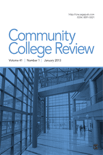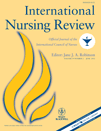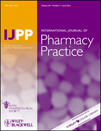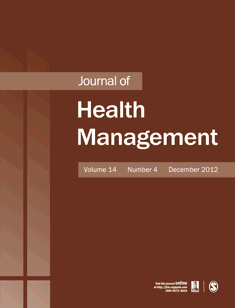
Human Resources for Health
Scope & Guideline
Advancing health systems through strategic workforce insights.
Introduction
Aims and Scopes
- Workforce Planning and Management:
Research in this area addresses the methodologies for estimating health workforce needs, implementing effective workforce planning strategies, and evaluating the impact of these strategies on health outcomes. - Health Workforce Policy and Governance:
This includes studies on the formulation and impact of policies related to health workforce education, regulation, and management, aiming to improve health service delivery and address workforce challenges. - Capacity Building and Training:
This scope focuses on the development and evaluation of training programs for healthcare professionals, including community health workers, to enhance their skills and improve healthcare delivery. - Workforce Retention and Job Satisfaction:
Research on factors influencing job satisfaction, retention rates, and turnover intentions among healthcare workers, highlighting the importance of workplace conditions and support systems. - Health Equity and Workforce Diversity:
Investigations into gender disparities, minority representation, and the implications of workforce diversity for health equity, particularly in low- and middle-income countries. - Impact of Global Events on Health Workforce:
Analysis of how global health crises, such as the COVID-19 pandemic, affect workforce dynamics, including burnout, mental health, and workforce migration. - Innovative Models of Care:
Exploration of new models for delivering health care that involve task-sharing, interdisciplinary collaboration, and the integration of technology into health workforce practices.
Trending and Emerging
- Mental Health and Well-being of Healthcare Workers:
Increasing attention is being paid to the mental health, burnout, and overall well-being of healthcare workers, especially in the context of the ongoing impact of the COVID-19 pandemic. - Integration of Technology in Workforce Management:
Research on the use of digital tools and telemedicine to enhance workforce efficiency and training is gaining momentum, addressing the need for modern solutions in healthcare delivery. - Community Health Worker Empowerment:
There is a growing body of literature focused on the empowerment, training, and integration of community health workers into health systems, recognizing their critical role in improving access to care. - Interdisciplinary Collaboration in Health Services:
Emerging studies emphasize the importance of interdisciplinary collaboration among healthcare professionals to enhance service delivery and patient outcomes. - Policy Responses to Global Health Crises:
Research analyzing the effectiveness of policy responses to global health emergencies, including lessons learned from the COVID-19 pandemic, is increasingly prevalent. - Addressing Health Equity through Workforce Diversity:
The journal is seeing more studies aimed at understanding how workforce diversity impacts health equity, particularly in underserved populations and low-resource settings. - Task-Sharing and Innovative Care Models:
There is a rising trend in exploring task-sharing practices and innovative models of care that optimize the use of available human resources to improve health outcomes.
Declining or Waning
- Traditional Workforce Structures:
Research focusing on conventional roles and hierarchies within the health workforce appears to be declining, as there is a growing emphasis on innovative, flexible, and collaborative models of care. - General Workforce Migration Trends:
While still relevant, the exploration of general trends in workforce migration has lessened, with more specific studies focusing on the impact of migration on health systems and individual healthcare worker experiences. - Single-Disease Focused Workforce Studies:
The focus on workforce issues related to single diseases (e.g., HIV, TB) is waning in favor of broader health systems approaches that address multiple health challenges and integrate care across various health domains. - Static Workforce Demographics:
Research that merely presents demographic data of healthcare workers without analysis of implications for policy and practice is becoming less common, as there is a shift towards actionable insights and recommendations. - Overemphasis on Quantitative Metrics:
There is a noticeable decline in studies that focus solely on quantitative metrics of workforce performance without contextual understanding, as qualitative insights are increasingly valued for comprehensive analysis.
Similar Journals

Community College Review
Shaping the Future of Community College PolicyCommunity College Review, published by SAGE Publications Inc, is a leading peer-reviewed academic journal dedicated to the exploration of community college education, policy, and practice. With its ISSN 0091-5521 and E-ISSN 1940-2325, this esteemed publication contributes significantly to the field of education, attaining a distinguished Q1 classification in the 2023 Education category and ranking #681 out of 1543 in the Scopus Social Sciences - Education rankings, placing it in the 55th percentile overall. Since its inception in 1973, the journal has evolved to address the complex challenges and trends in community colleges, making it an invaluable resource for researchers, practitioners, and policymakers striving to enhance educational outcomes. While not an open-access publication, Community College Review ensures rigorous scholarly standards, fostering a vibrant dialogue on the future direction of community colleges in America. Its insightful articles and critical analyses serve to advance the study and practice of education at these vital institutions.

Journal of Primary Health Care
Fostering collaboration in the realm of primary health care.Journal of Primary Health Care, published by CSIRO PUBLISHING, is a premier open-access journal dedicated to advancing the field of primary health care since its inception in 2009. With an E-ISSN of 1172-6156, the journal serves as a vital platform for disseminating innovative research and practices that improve health outcomes across diverse populations. Featuring a robust H-index and notable rankings—including Q2 in Family Practice and Q3 in both Medicine (miscellaneous) and Public Health—this journal holds a significant position within the academic community, offering valuable insights to researchers, practitioners, and students alike. By providing open-access options, the Journal of Primary Health Care ensures that its findings are accessible to a global audience, promoting collaboration and knowledge sharing. As we look toward 2024, we invite contributors to be part of this dynamic conversation, addressing the critical issues in primary health care delivery and policy.

Journal of Healthcare Leadership
Empowering leaders to shape the future of healthcare.Journal of Healthcare Leadership, published by DOVE MEDICAL PRESS LTD, is a distinguished open-access journal dedicated to advancing the field of healthcare leadership and management since its establishment in 2010. With an ISSN of 1179-3201, this peer-reviewed journal is recognized for its significant impact, currently holding prestigious Q1 quartile rankings in Leadership and Management and Public Health, along with Q2 in Organizational Behavior and Human Resource Management. The journal serves as a vital platform for scholars, practitioners, and students, offering insights into innovative leadership strategies and their implications in the dynamic healthcare environment. Operating from its base in Albany, New Zealand, The Journal of Healthcare Leadership also boasts impressive standings in Scopus rankings, including a top quartile position in Nursing Leadership and Management. With a strong commitment to open access, the journal ensures that high-quality research is readily available to its audience, reinforcing its role as a crucial resource for those aiming to influence healthcare policy, management, and education.

INTERNATIONAL NURSING REVIEW
Empowering Nurses Through Rigorous Scholarship.Welcome to the INTERNATIONAL NURSING REVIEW, a premier journal dedicated to advancing the field of nursing through rigorous research and comprehensive analysis. Published by Wiley, this esteemed journal has been at the forefront of nursing scholarship since its inception in 1960 and continues to serve as a vital resource for healthcare professionals, researchers, and students alike. Boasting an impressive Q1 ranking in the miscellaneous nursing category and a prominent position as the 5th ranked journal in General Nursing according to Scopus, it represents the pinnacle of academic excellence with a 96th percentile in its field. Although it is not an open-access publication, the journal’s commitment to high-quality peer-reviewed content ensures that subscribers gain access to the latest advancements, evidence-based practices, and innovative approaches in nursing. With a global reach, the INTERNATIONAL NURSING REVIEW is an essential platform for disseminating research that informs clinical practice and shapes the future of nursing. Join the conversation and explore the breadth of knowledge available from this distinguished publication.

Revista Medica del Uruguay
Advancing medical knowledge for a healthier tomorrow.Revista Medica del Uruguay is a distinguished open-access journal published by the SINDICATO MEDICO URUGUAY, dedicated to advancing knowledge in the medical field since its inception. With an ISSN of 0303-3295 and an E-ISSN of 1688-0390, this journal provides a platform for researchers, professionals, and students to share their findings and insights in a rapidly evolving healthcare landscape. Based in Montevideo, Uruguay, it plays a pivotal role in promoting health research within Latin America and beyond. Since transitioning to open access in 2002, the journal has significantly broadened its reach, allowing for greater dissemination of vital research and fostering collaboration among medical professionals. The Revista Medica del Uruguay remains committed to publishing high-quality articles that contribute to the improvement of medical practices, ultimately enhancing patient care and health outcomes. Researchers and practitioners seeking to stay informed about the latest developments in medicine will find this journal an invaluable resource.

NEW ZEALAND MEDICAL JOURNAL
Pioneering the Future of Medical Research in New ZealandNEW ZEALAND MEDICAL JOURNAL, published by the NEW ZEALAND MEDICAL ASSOCIATION, has been a prominent platform for disseminating significant medical research since its inception in 1945. Serving as an essential resource for healthcare professionals, researchers, and students in the field of medicine, this journal encompasses a wide array of topics in General Medicine, contributing to the dynamic discourse in the medical community. With an ISSN of 0028-8446 and an E-ISSN of 1175-8716, the journal enjoys good visibility and is ranked in the Q3 quartile of the Medicine (miscellaneous) category in 2023, highlighting its respectable standing among peers. Moreover, with a Scopus rank of #221 out of 636 and a percentile rating of 65%, it plays a crucial role in influencing medical research trends and practices in New Zealand and beyond. Though not operating under an open-access model, the journal guarantees a valuable exchange of scholarly work and critical insights, making it an indispensable instrument for anyone dedicated to advancing health care knowledge and research in the region.

INTERNATIONAL JOURNAL OF PHARMACY PRACTICE
Elevating healthcare standards with innovative pharmacy insights.INTERNATIONAL JOURNAL OF PHARMACY PRACTICE is a distinguished peer-reviewed journal published by Oxford University Press that has been serving the pharmacy and healthcare community since 1991. With the ISSN 0961-7671 and E-ISSN 2042-7174, the journal aims to advance the field of pharmacy practice through the dissemination of high-quality research and innovative practices. The journal is recognized for its impactful contributions, holding a Q1 status in Pharmacy and laying within the Q2 to Q3 quartiles across various health-related categories in 2023, underscoring its commitment to excellence. It occupies a notable position within Scopus rankings, most prominently within the Health Professions: Pharmacy category, where it ranks 12th out of 45 journals, reflecting its relevance and significance in the field. Scholars and practitioners benefit from the journal's rich repository of knowledge that encompasses diverse topics, including pharmaceutical sciences and health policy, supporting the development and enhancement of pharmacy practices worldwide. Although it is not an open-access journal, it continues to be a crucial resource for professionals and academics seeking to stay at the forefront of pharmacy practice advancements.

Journal of Health Management
Advancing Health Management Insights for a Better TomorrowThe Journal of Health Management, published by SAGE PUBLICATIONS INDIA PVT LTD, stands as a pivotal academic platform dedicated to advancing knowledge in the field of health management and policy. Established in 1994, the journal has evolved to encompass a broad spectrum of topics within health services, public health, and health policy, targeting an array of stakeholders including researchers, practitioners, and policymakers. With an ISSN of 0972-0634 and an E-ISSN of 0973-0729, the journal is indexed in Scopus, where it holds respectable rankings in both the Business and Medicine domains, particularly in health policy, affirming its impact and relevance (Ranking: #137/310 with a percentile of 55th). Although it is categorized in the Q3 Health Policy quartile for 2023, the journal is set to play an instrumental role in shaping health management discourse in India and beyond. It offers a rich collection of research articles, reviews, and case studies, with no Open Access charges, making it a valuable resource for academics and practitioners alike who seek to enhance their understanding of health management issues.

JAAPA-Journal of the American Academy of Physician Assistants
Connecting Research and Clinical Excellence.JAAPA - Journal of the American Academy of Physician Assistants is a leading publication in the field of Physician Assistant studies, providing a vital platform for the dissemination of innovative research, clinical practice insights, and professional development information. Published by Lippincott Williams & Wilkins, this esteemed journal has an ISSN of 1547-1896 and an E-ISSN of 0893-7400, reflecting its commitment to scholarly excellence since its inception in 1989. With a robust impact factor that situates it in the Q3 category of miscellaneous Medicine and Q2 in Nurse Assisting, JAAPA stands as a pivotal resource for healthcare professionals, researchers, and students aiming to enhance their understanding and practice of physician assistance. Accessible through various academic platforms, JAAPA aims to bridge gaps in knowledge while fostering a community of informed practitioners, thus contributing meaningfully to the evolving landscape of healthcare delivery in the United States and beyond.

Healthcare in Low-resource Settings
Advancing healthcare equity in resource-limited environments.Healthcare in Low-resource Settings, published by PAGEPRESS PUBL in Italy, is an esteemed open-access journal that has been committed to advancing knowledge and innovative practices in the healthcare domain since 2013. With an E-ISSN of 2281-7824, this journal focuses on critical issues pertinent to health policy, public health, and social sciences, particularly in settings marked by limited resources. Despite its recent categorization in the Q4 quartile for various health-related disciplines in 2023, the journal serves as a vital platform for disseminating research aimed at improving health outcomes in underserved populations. Researchers, professionals, and students alike can access its content freely, promoting widespread engagement and exchange of ideas within the global health community. By publishing high-quality, peer-reviewed articles, Healthcare in Low-resource Settings seeks to bridge gaps in healthcare knowledge and advocates for sustainable solutions to pressing health issues, particularly in vulnerable communities.